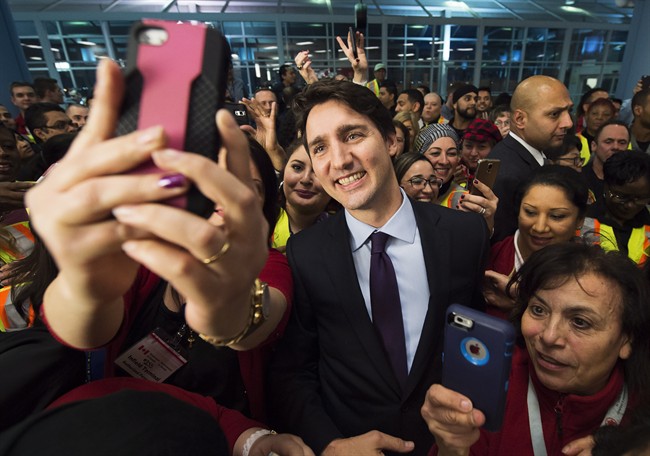Is the Liberal government backing away from its commitment to refugees? After campaigning on compassion, Ottawa is now facing a perfect storm of surging asylum claims, an overburdened system and political pressure.

All three factors, refugee advocates say, have led the government to back down on its pledge to overhaul the way asylum claims are processed, reports The Canadian Press, and stop risking both money and political capital on an issue that could cost them support at home and abroad.
The top reason for the change of heart — on this and so many files — appears to be the changing of the guard in Washington. Ottawa is now dealing with an administration that is, to put it charitably, not refugee-positive.
It’s also not NAFTA-positive, softwood lumber-positive or — as the firing of FBI Director James Comey demonstrated — rule-of-law positive. In short, antagonizing President Donald Trump by welcoming more refugees is not in Trudeau’s interest, especially when he is staring down the barrel of trade negotiations with a volatile and unpredictable administration.
Trump’s immigration ideas have also spilled over into Canada. As immigration lawyer Lorne Waldman told The Canadian Press, “The concern at the centre is that support has dissipated significantly because of a series of factors, the most important one being the emergence of Donald Trump … And I think the concern is amplified by the Conservative leadership race where you have many of the candidates taking a very anti-immigrant posturing in their campaign.”
- Trudeau tight-lipped on potential U.S. TikTok ban as key bill passes
- Canadian man dies during Texas Ironman event. Her widow wants answers as to why
- Hundreds mourn 16-year-old Halifax homicide victim: ‘The youth are feeling it’
- On the ‘frontline’: Toronto-area residents hiring security firms to fight auto theft
It remains to be seen how well leadership aspirant Kellie Leitch does with Conservative supporters, but her Trumpian proposal to screen immigrants for “Canadian values” has the support of a majority of Canadians polled on the question; almost half support her pledge to deport border-crossers back to the United States.
And the impact of those border-crossers is being most acutely felt in two provinces, Manitoba and Quebec — the latter a province where the Liberals hold 40 of 78 seats. Until flooding swamped headlines two weeks ago, francophone media outlets were reporting extensively on refugees illegally crossing the border near Lacolle, a town close to the U.S. border.
“Canadian border services are enraged,” said Jean-Pierre Fortin, national president of the Customs and Immigration Union. “They are convinced that the Americans are getting rid of the problem by bringing the migrants to Roxham Road rather than driving them to the Lacolle border crossing.”
And the “problem” keeps growing. The number of migrants claiming refugee status at land points of entry in Quebec has swelled from 985 in 2015, to 2,500 in 2016, to 1,885 in the first three months of 2017 alone. Overall, the number of asylum claims in all of Canada has increased from 16,115 in 2015, to 23,895 in 2016. In the first three months of 2017, 5,520 people have applied for asylum.
This surge is putting pressure on the Immigration and Refugee Board, creating a backlog of hearings. According to Jean-Sébastien Boudreault, the president of the Association québécoise des avocats et avocates en droit de l’immigration (AQAADI), half of all cases are now postponed indefinitely. “Right now, I have colleagues who file requests for refugee status, and for one out of two cases, the hearing is postponed because there is no board member available — because there’s a lack of resources to analyze these cases.”
The same day that this story appeared in April, reports also emerged of a study showing that a handful of Syrian refugees had paid their sponsors to support them in Canada — some of whom had apparently asked for the money. Both practices are illegal, and while the number of refugees is small — 23 out of 581 who were the subject of the study — it raised questions about abuse of the program.
The same study also found that compared to refugees from other countries, Syrian refugees were less educated, had a poorer grasp of French and English, had bigger families and less knowledge about Canadian rights and freedoms — and that, one year after their arrival, only 10 per cent of government-sponsored adult refugees had found employment.
All these factors probably did — and should — give the government pause when it comes to reforming the refugee system, particularly the country-of-origin system which allows for the fast-tracking of refugee claims from countries with traditionally high acceptance rates.
Politically, however, this decision opens the Liberals up to attacks from both sides: from the NDP, taking the Liberals to task for reneging on their pledge to make Canada more welcoming to refugees, and from the Conservatives, pointing to the IRB’s inability to process cases in a timely manner, as well as the potential threat to national security posed by undocumented migrants.
Add to this the amount of resources we’d need to speed things along, at a time when budgets are stretched to the limit, and it’s unlikely we’ll be seeing Trudeau posing for photo-ops with newly-arrived refugees at airports anytime soon. For the Liberals, the refugee file has officially turned from campaign asset to government liability.
Tasha Kheiriddin can be heard between noon and 2 p.m. ET on Toronto Talk Radio AM640. She’s also a columnist with Global News and iPolitics.ca, where this piece first appeared.








Comments